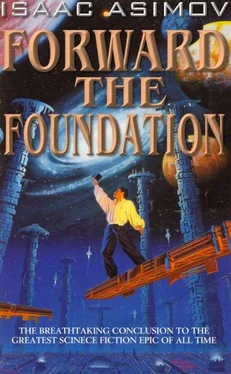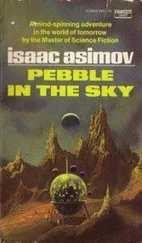How did he come to be here?
Over and over again, he felt the past in his mind, ran his mental tendrils along the line of development of his life. It was part of growing older, no doubt. There was so much more in the past, so much less in the future, that the mind turned away from the looming shadow ahead to contemplate the safety of what had gone before.
In his case, though, there was that change. For over thirty years psychohistory had developed in what might almost be considered a straight line—progress creepingly slow but moving straight ahead. Then six years ago there had been a right-angled turn—totally unexpected.
And Seldon knew exactly how it had happened, how a concatenation of events came together to make it possible.
It was Wanda, of course, Seldon’s granddaughter. Hari closed his eyes and settled into his chair to review the events of six years before.
Twelve-year-old Wanda was bereft. Her mother, Manella, had had another child, another little girl, Bellis, and for a time the new baby was a total preoccupation.
Her father, Raych, having finished his book on his home sector of Dahl, found it to be a minor success and himself a minor celebrity. He was called upon to talk on the subject, something he accepted with alacrity, for he was fiercely absorbed in the subject and, as he said to Hari with a grin, “When I talk about Dahl, I don’t have to hide my Dahlite accent. In fact, the public expects it of me.”
The net result, though, was that he was away from home a considerable amount of time and when he wasn’t, it was the baby he wanted to see.
As for Dors—Dors was gone—and to Hari Seldon that wound was ever-fresh, ever-painful. And he had reacted to it in an unfortunate manner. It had been Wanda’s dream that had set in motion the current of events that had ended with the loss of Dors.
Wanda had had nothing to do with it—Seldon knew that very well. And yet he found himself shrinking from her, so that he also failed her in the crisis brought about by the birth of the new baby.
And Wanda wandered disconsolately to the one person who always seemed glad to see her, the one person she could always count on. That was Yugo Amaryl, second only to Hari Seldon in the development of psychohistory and first in his absolute round-the-clock devotion to it. Hari had had Dors and Raych, but psychohistory was Yugo’s life; he had no wife and children. Yet whenever Wanda came into his presence, something within him recognized her as a child and he dimly felt—for just that moment—a sense of loss that seemed to be assuaged only by showing the child affection. To be sure, he tended to treat her as a rather undersized adult, but Wanda seemed to like that.
It was six years ago that she had wandered into Yugo’s office. Yugo looked up at her with his owlish reconstituted eyes and, as usual, took a moment or two to recognize her.
Then he said, “Why, it’s my dear friend Wanda. —But why do you look so sad? Surely an attractive young woman like you should never feel sad.”
And Wanda, her lower lip trembling, said, “Nobody loves me.”
“Oh come, that’s not true.”
“They just love that new baby. They don’t care about me anymore.”
“I love you, Wanda.”
“Well, you’re the only one then, Uncle Yugo.” And even though she could no longer crawl onto his lap as she had when she was younger, she cradled her head on his shoulder and wept.
Amaryl, totally unaware of what he should do, could only hug the girl and say, “Don’t cry. Don’t cry.” And out of sheer sympathy and because he had so little in his own life to weep about, he found that tears were trickling down his own cheeks as well.
And then he said with sudden energy, “Wanda, would you like to see something pretty?”
“What?” sniffled Wanda.
Amaryl knew only one thing in life and the Universe that was pretty. He said, “Did you ever see the Prime Radiant?”
“No. What is it?”
“It’s what yuor grandfather and I use to do our work. See? It’s right here.”
He pointed to the black cube on his desk and Wanda looked at it woefully. “That’s not pretty,” she said.
“Not now,” agreed Amaryl. “But watch when I turn it on.”
He did so. The room darkened and filled with dots of light and flashes of different colors. “See? Now we can magnify it so all the dots become mathematical symbols.”
And so they did. There seemed a rush of material toward them and there, in the air, were signs of all sorts, letters, numbers, arrows, and shapes that Wanda had never seen before.
“Isn’t it pretty?” asked Amaryl.
“Yes, it is,” said Wanda, staring carefully at the equations that (she didn’t know) represented possible futures. “I don’t like that part, though. I think it’s wrong.” She pointed at a colorful equation to her left.
“Wrong? Why do you say it’s wrong?” said Amaryl, frowning.
“Because it’s not . . . pretty. I’d do it a different way.”
Amaryl cleared his throat. “Well, I’ll try to fix it up.” And he moved closer to the equation in question, staring at it in his owlish fashion.
Wanda said, “Thank you very much, Uncle Yugo, for showing me your pretty lights. Maybe someday I’ll understand what they mean.”
“That’s all right,” said Amaryl. “I hope you feel better.”
“A little, thanks,” and, after flashing the briefest of smiles, she left the room.
Amaryl stood there, feeling a trifle hurt. He didn’t like having the Prime Radiant’s product criticized—not even by a twelve-year-old girl who knew no better.
And as he stood there, he had no idea whatsoever that the psychohistorical revolution had begun.
That afternoon Amaryl went to Hari Seldon’s office at Streeling University. That in itself was unusual, for Amaryl virtually never left his own office, even to speak with a colleague just down the hall.
“Hari,” said Amaryl, frowning and looking puzzled. “Something very odd has happened. Very peculiar.”
Seldon looked at Amaryl with deepest sorrow. He was only fifty-three, but he looked much older, bent, worn down to almost transparency. When forced, he had undergone doctors’ examinations and the doctors had all recommended that he leave his work for a period of time (some said permanently) and rest . Only this, the doctors said, might improve his health. Otherwise— Seldon shook his head. “Take him away from his work and he’ll die all the sooner—and unhappier. We have no choice.”
And then Seldon realized that, lost in such thoughts, he was not hearing Amaryl speak.
He said, “I’m sorry, Yugo. I’m a little distracted. Begin again.”
Amaryl said, “I’m telling you that something very odd has happened. Very peculiar.”
“What is it, Yugo?”
“It was Wanda. She came in to see me—very sad, very upset.”
“Why?”
“Apparently it’s the new baby.”
“Oh yes,” Hari said with more than a trace of guilt in his voice.
“So she said and cried on my shoulder—I actually cried a bit, too, Hari. And then I thought I’d cheer her up by showing her the Prime Radiant.” Here Amaryl hesitated, as if choosing his next words carefully.
“Go on, Yugo. What happened?”
“Well, she stared at all the lights and I magnified a portion, actually Section 42R254. You’re acquainted with that?”
Seldon smiled. “No, Yugo, I haven’t memorized the equations quite as well as you have.”
“Well, you should,” said Amaryl severely. “How can you do a good job if— But never mind that. What I’m trying to say is that Wanda pointed to a part of it and said it was no good. It wasn’t pretty .”
“Why not? We all have our personal likes and dislikes.”
Читать дальше











